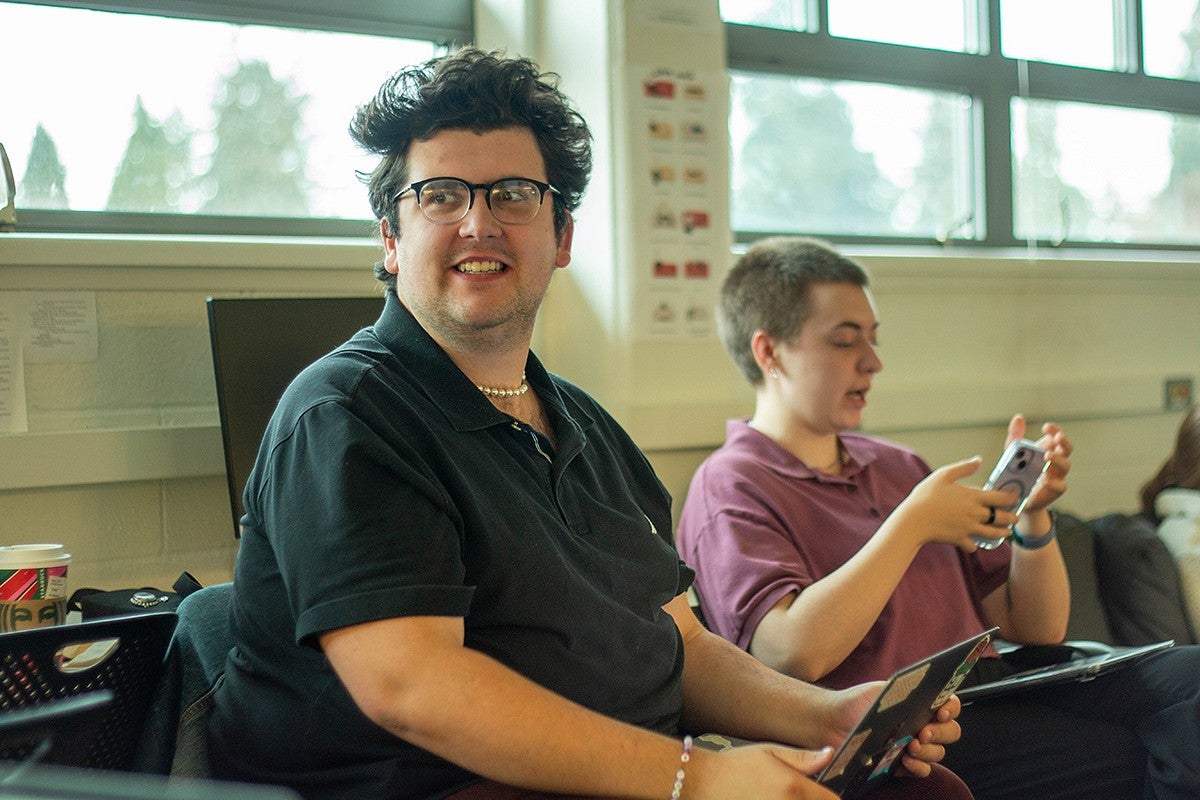
Building a community in journalism
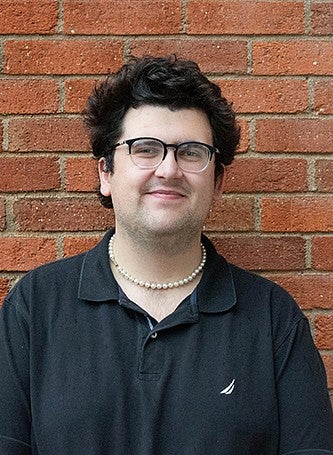
Hometown: Portland
Majors: Political Science
Song on Repeat: "My Love Mine All Mine" by Mitski
On the holiday wishlist: A really good mug to sip coffee out of would be great to keep in the office.
Currently Bingeing: “Grey's Anatomy”
Favorite Quote: “Do the best you can until you know better. Then, when you know better, do better.” -Maya Angelou
Advice for CHC Students: Take Inside Out. Inside Out was the best thing I’ve done in college besides The Emerald, and even then it might be close. I can not talk about how much I loved that class and how much it changed my perspective on everything.
At October’s annual Halloween party hosted by the Daily Emerald, Evan Reynolds attended dressed as Mrs. Doubtfire, the cross-dressing character played by Robin Williams in the 1993 movie of the same name.
As the news organization’s staff conversed and danced around him, he sat hunched over his laptop, curlers in his hair, carefully editing a page for publication.
Reynolds—a Clark Honors College senior—is the editor in chief of the Daily Emerald, the University of Oregon’s independent weekly newspaper.
This fall, he’s spent most of his time acclimating to the leadership role. He has focused much of his work on developing relationships with staff members and working on establishing an investigative journalism team. He’s also started work on his Honors College thesis project that will look at voting patterns of U.S. residents.
Reynolds was born and raised in Portland, with his younger brother and parents, both of whom are deaf. In a lot of ways, growing up with deaf parents wasn’t something Reynolds had to think about. “It’s like, ‘What’s it like having hearing parents?’ Right?” It’s just a way of life, Reynolds says.
But in other ways, being a child of deaf adults opened Reynolds’ eyes to the inequalities of the world around him. “It’s taught me about what it’s like to be unheard,” he says. “There are these issues of accessibility that are present in everyday life that are not addressed.”
Things like a lack of subtitles on the screen when going to a movie theater, the inability to lip-read when people are wearing masks, and a lack of interpreters in essential places like airports are all ways that Reynolds sees how the world feels shut off for his family.
But even with the obstacles, Reynolds says that his family feels that “being deaf is not a disability; it’s a different way of being. I love my parents. I can’t imagine what my life would be like without it.”
Coming out of his shell
Growing up, Reynolds says he bounced different career options around. At first, he wanted to be an astronaut. Then maybe president. He also thought about being a fiction writer like his dad, Matthew Rudd Reynolds. “I wrote a lot of stories when I was growing up and I just consumed books voraciously,” he recalls. “I would get in trouble when I was in first and second grade because I was reading in the back of the class instead of paying attention to math.”
In elementary school, Reynolds says he spent most of his time in the back of the class. After being diagnosed with Asperger’s Syndrome at the age of seven, he says he had a hard time forming social connections.
It wasn’t until his fourth-grade teacher, Theresa Egan, helped him that he started to engage with other kids. Reynolds remembers Egan encouraging him to talk in a group discussion in class.
“She pulled me out and she was like, ‘Hey, I think a lot of people would really enjoy hearing what you have to say. Just give it a try’,” he recalls. “And I ended up making a couple of really good friends that week just from actually plugging in.”
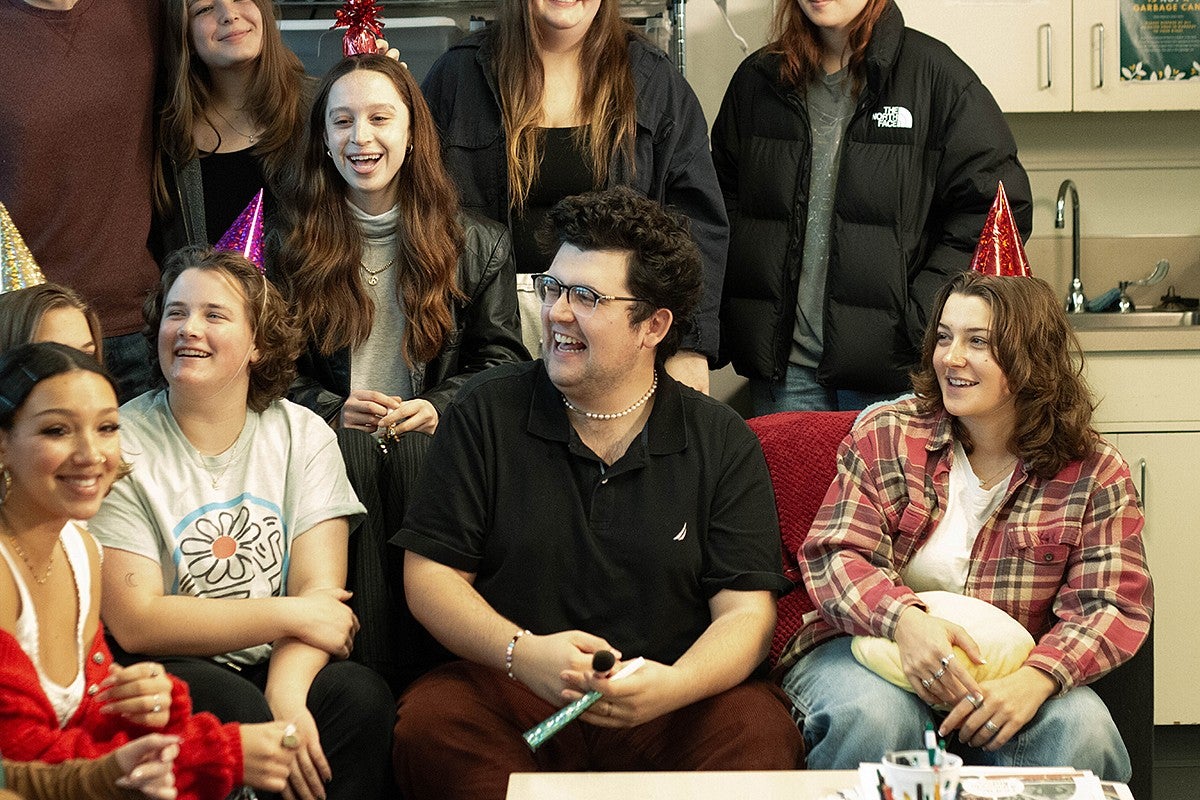
As she taught Reynolds for two years, Egan watched as her student grew into a confident, social community member. “He was a kid that everyone felt safe with, entertained by, and respected as an individual, by adults and kids,” she recalls.
The pursuit of a passion
In high school, Reynolds became interested in politics. As a sophomore, he was a part of Lincoln High School’s award-winning Constitution Team. “We just had teachers and professors emeriti and lawyers come in and tell us everything a person could possibly know about current events, constitutional law, and issues of social justice,” Reynolds says. “For 15-year-old me, that was a really big political education.”
Hearing the guest speakers sparked an interest in politics and social justice. At the same time, he happened upon a course – “Introduction to Mass Communications” – that allowed him to unite his love of writing and politics.
The next year, he joined the Cardinal Times, Lincoln’s school newspaper, where he later became editor-in-chief. Mary Rechner, the newspaper advisor, remembers Reynolds as a “charismatic person who cared deeply about others.”
“Evan understands and takes seriously the responsibility of the press to report stories that are important to the community, while balancing the ethics of prioritizing accuracy and minimizing harm,” Rechner says.
As the editor, Reynolds dipped his toes in every aspect of the paper, something that proved invaluable. “You have to rewrite articles. You have to go on InDesign… distribute the paper. I learned a bit about every side of the process,” Reynolds recalls.
After high school, he initially planned to go to American University. But when the pandemic hit, he decided to go to UO to be closer to his family, especially during a freshman year that was mostly online.
In a year that felt “like a blur” to Reynolds, one class stood out. Tobin Hansen’s Honors College class “Deportation from the United States.” It kept him engaged through what he says was a monotonous time of asynchronous learning.
It was “one of the first classes to really show me how cool the CHC is,” he says. “You can take courses on specific topics from professors who are immersed in that same ongoing research.”
During his freshman year, he applied for a position at the Emerald, but his application never made it through. “If you’re a freshman who’s never heard back from the Emerald about your application because you submitted it wrong, you’re not alone,” he says, jokingly. “And now I’m here. So, you, too, can become an editor-in-chief in four years.”
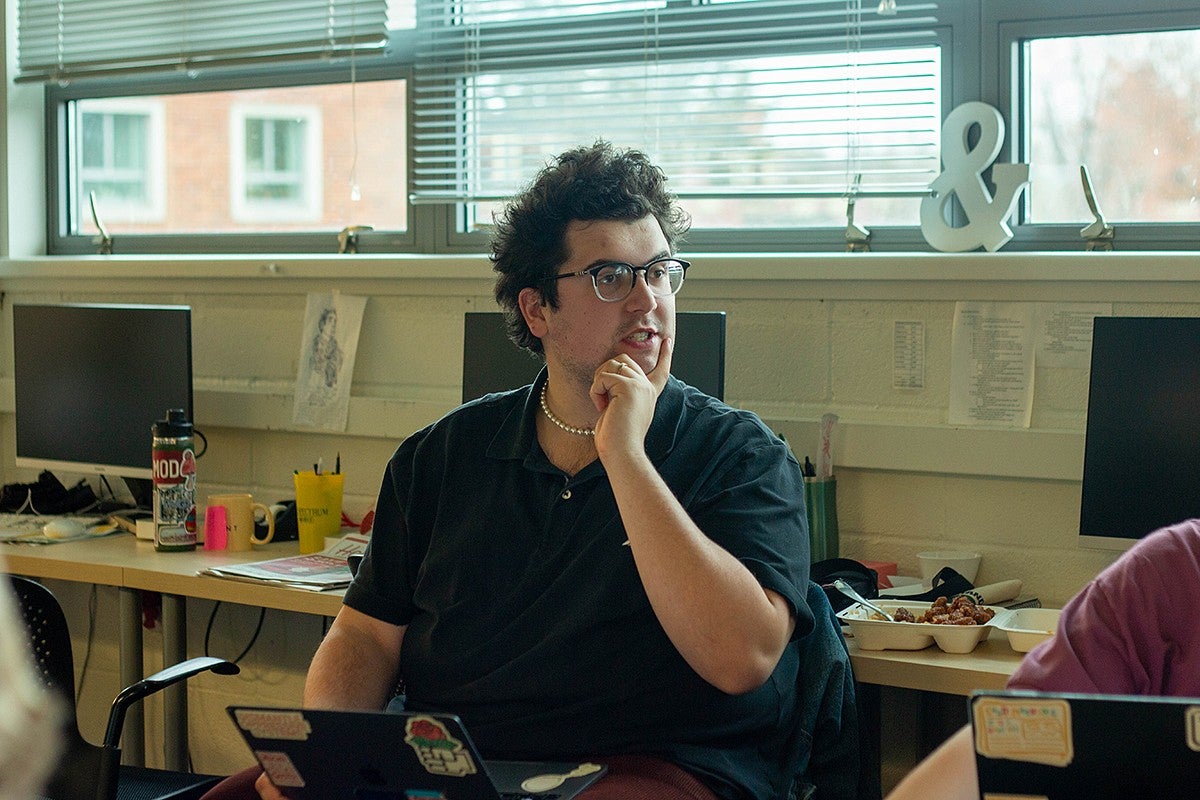
He started as a health reporter in his sophomore year and went on to work for the arts and culture desk, report on the news, and tackle community engagement issues for the paper.
When the Emerald’s publisher and the editor-in-chief approached him about applying for the top position, he felt honored. He worked hard to improve his writing and leadership skills, and he was hired the summer after his junior year.
Today, his work consists of hiring new staff, editing stories, looking over the print edition before it’s published and leading weekly staff meetings.
Eric Henry, the Emerald’s publisher, says Reynolds’ energy, sense of humor, and attention to detail are all qualities that make him an excellent leader.
“We get small tour groups or curious people who come by the Emerald offices in the EMU. I’ve seen Evan jump in and spontaneously lead a tour, enthusiastically explaining how students can get involved,” says Henry. “His sense of fun, but also focus, is clear in the culture at the Emerald.”
Scrambling on deadline
Fall term has been chaos, Reynolds says, with back-to-back deadlines, meetings and other non-descript tasks. He’s also been working on his thesis, which will focus on ways that voters make assumptions about candidates based on their identities.
“There’s documented political science literature that shows white voters see candidates of color as more liberal or left-wing than they actually are,” Reynolds says. “That has severe implications for representation in legislative bodies because people who are seen as more ‘extreme’ are less likely to win.”
“Politics is the thing I tell myself I want to do. It’s the thing that excites me extensively. But in terms of where my life has actually leaned and what I keep falling back into, it is journalism over and over. And that can’t be coincidence, right?”
His thesis advisor, Neil O’Brian, says the most impressive part of his work is the research he’s embarking on and his fearlessness of working with data analysis.
“A lot of students struggle with this, or choose not to engage with it,” O’Brian says. “That Evan is doing it speaks to his tenacity and ability to learn.”
As for Reynolds’ future, he’s thinking short-term and long-term. His first goal: “Graduate with my head still on, which will be a real accomplishment,” he jokes.
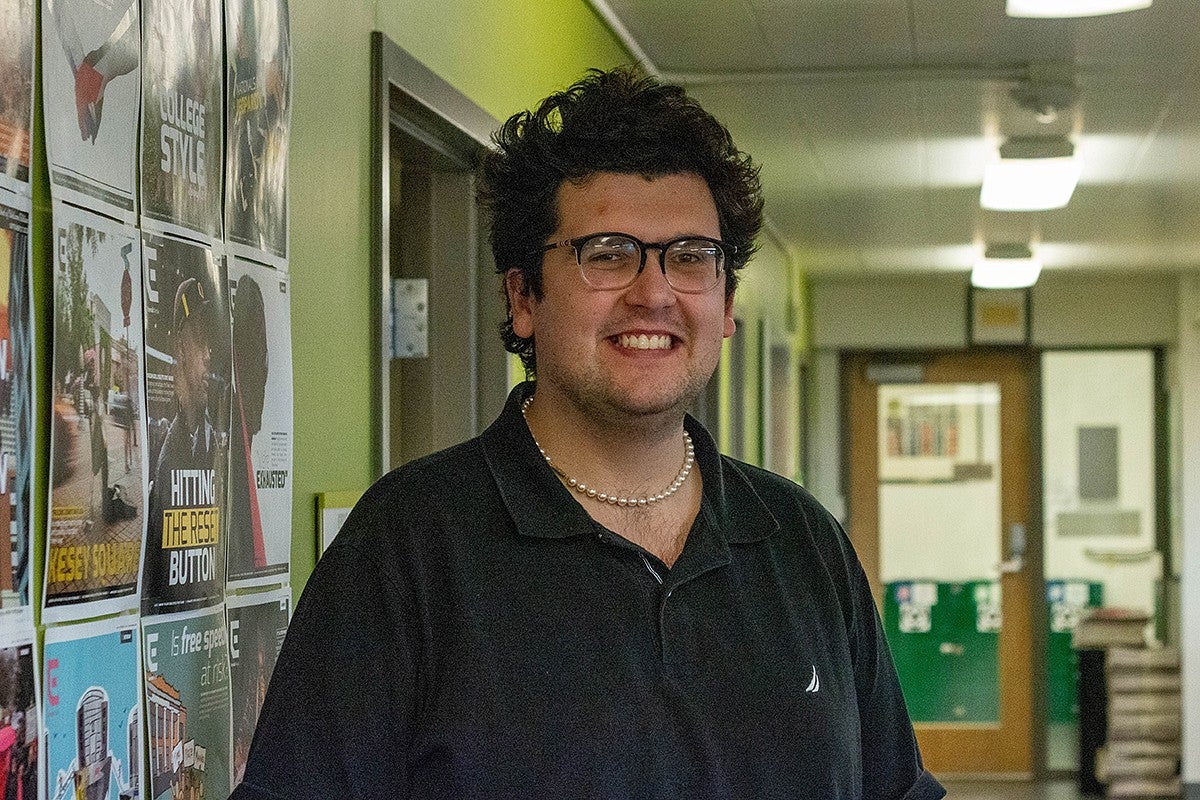
After that, he says he doesn’t want to tie himself to one job or place. A big part of him still wants to pursue politics.
“I always joke that if I had a dream job it would be like Steve Kornacki on MSNBC, like the bow tie, pointing on a map.”
But Reynolds is also keeping an open mind for journalism.
“Politics is the thing I tell myself I want to do. It’s the thing that excites me extensively,” he says. “But in terms of where my life has actually leaned and what I keep falling back into, it is journalism over and over. And that can’t be coincidence, right?”
